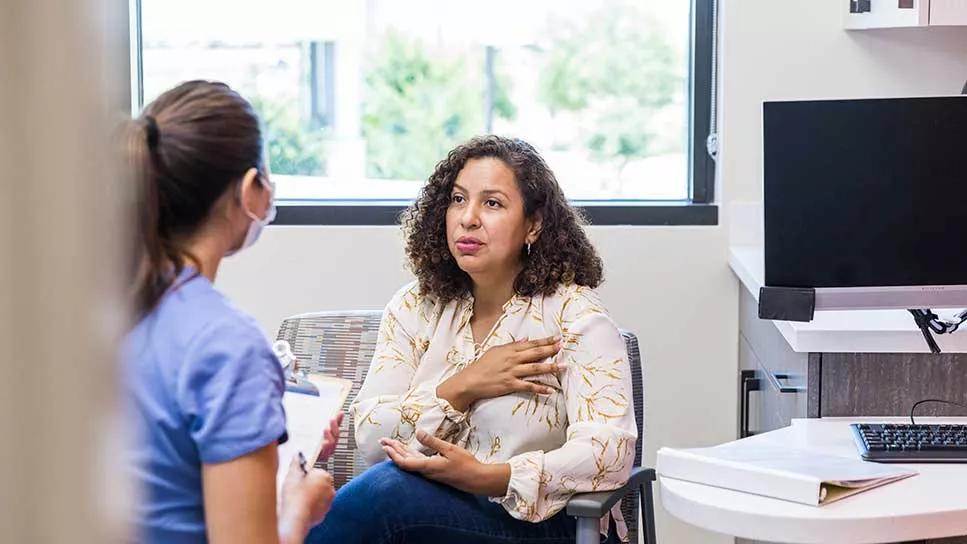Hormone changes may lead to sore breasts, but lifestyle changes can help

Image content: This image is available to view online.
View image online (https://assets.clevelandclinic.org/transform/479912ea-b6da-4bc3-baf3-189c8b0bc5c0/Breast-Pain-Menopause-1421939057-967x544-1_jpg)
older female showing doctor where breast tenderness is
Menopause — and the years leading up to it — is often called “the change of life,” and for good reason. This time can bring a slew of changes that affect how you feel physically and emotionally.
Advertisement
Cleveland Clinic is a non-profit academic medical center. Advertising on our site helps support our mission. We do not endorse non-Cleveland Clinic products or services. Policy
As hormones fluctuate and dip, you may experience breast pain. Ob/Gyn Julia Girzhel, MD, explains what to expect and how to get relief.
When your ovaries stop releasing eggs, it signals to your body to end your monthly menstrual cycles.“There’s no test for menopause,” says Dr. Girzhel. “You know you’ve entered menopause if you’ve gone without a menstrual period for at least 12 months.”
The average age of menopause in the United States is 51.
Your breasts are very sensitive to hormone changes because breast tissue has estrogen and progesterone receptors, says Dr. Girzhel. So, the hormonal changes that happen during perimenopause (the time prior to menopause) can affect how your breasts feel.
Menopause itself typically doesn’t cause breast pain (mastalgia).
In fact, “Once you enter menopause, you’re much less likely to have breast soreness,” shares Dr. Girzhel.
After your period stops, estrogen and progesterone significantly decrease.
Your healthcare provider may prescribe hormone replacement therapy (HRT) for severe hot flashes or night sweats associated with menopausal transition. Research shows that HRT may increase your chances of breast pain.
“At any phase of life, hormone therapy (whether HRT or birth control pills) can cause breast pain,” says Dr. Girzhel.
Advertisement
Perimenopause, the first stage of menopause, is a much more hormonally tumultuous period than the postmenopausal years. Perimenopause symptoms may begin up to 10 years before menopause. Perimenopause typically starts in your 40s, but some symptoms can begin as early as your 30s.
“You’re more likely to experience breast pain during perimenopause,” says Dr. Girzhel.
Estrogen and progesterone levels may change a lot during perimenopause. These fluctuations can lead to breast discomfort that may range from mild to intense in one or both breasts. You may experience:
You also may experience cycle-related breast pain, where your breasts get sore during the same phase of your menstrual cycle each month, typically seven to 10 days before expected menses.
During the perimenopause years, you may develop breast cysts (fibrocystic breasts), which are benign (noncancerous) lumps. These cysts can make your breasts even more tender, and the cysts may get larger or smaller at different points in your menstrual cycle. Your chance of developing breast cysts is higher if you use hormone therapy.
While benign cysts are common during perimenopause, if you ever notice a new breast lump, be sure to see your provider to rule out cancer. Dr. Girzhel also advises doing monthly self-breast exams to check for new changes and lumps, no matter what stage of life you’re in.
“Breast pain is rare once you’ve entered menopause,” says Dr. Girzhel. “If you have new breast tenderness after menopause, and especially if it’s only in one breast, get it checked out.”
Menopausal breast pain doesn’t always mean cancer. Sometimes, a benign breast mass can develop during menopause and cause pain. And what feels like breast pain may actually be sore chest muscles from a recent workout or activity.
If there’s a concern about your breast health, your provider may order a mammogram. Depending on the mammogram results, you may also need an ultrasound or breast MRI to get more information.
“If you have breast pain, the first thing to do is talk to your provider,” advises Dr. Girzhel.
They can do an exam to rule out serious concerns. Then, they may recommend lifestyle changes to reduce breast pain.
Dr. Girzhel suggests:
Advertisement
Breast pain (and other troublesome perimenopause symptoms) will most likely go away after you’ve entered menopause. Until that happens, work with your provider on ways to reduce and get rid of pain. With the right strategies, you can live more comfortably and enjoy everything this stage of life has to offer.
Advertisement

Sign up for our Health Essentials emails for expert guidance on nutrition, fitness, sleep, skin care and more.
Learn more about our editorial process.
Advertisement
Estrogen loss contributes to bone loss, which significantly raises your risk of osteopenia and osteoporosis
Making certain changes to your diet, sleep habits and even your wardrobe may help lessen the impact of menopause symptoms
A women’s health specialist explains those cold flashes that come on quickly
Changing hormone levels can bring issues like brittle nails, indigestion, dry skin and new allergies (to name a few!)
The choices you make at mealtime could reduce hot flashes or make them worse
If you’ve noticed changes in your mood and mental health while going through menopause, you’re not alone
Missed periods, heavy periods, painful sex and frequent hot flashes are just a few symptoms worth discussing with your provider
At-home tests measure FSH levels in urine, but they can’t actually diagnose menopause
Prioritize your health by managing stress, strengthening your social connections and getting quality sleep
Bolsters, blankets, pillows and blocks can offer extra support, stability and comfort
Allergies, postnasal drip, asthma or reflux could be to blame for a cough that won’t quit